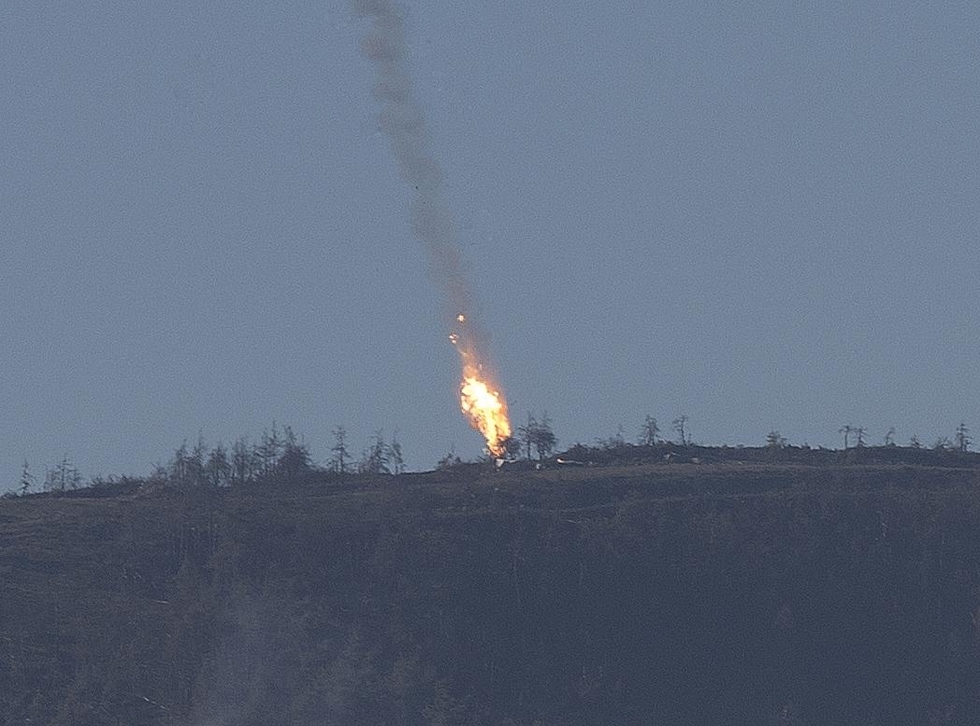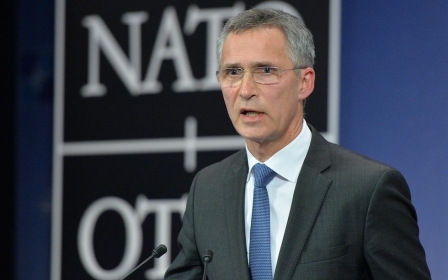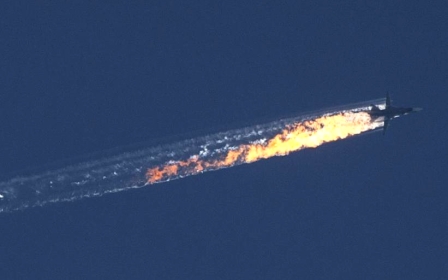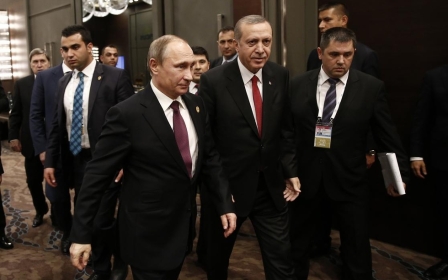Russian-Turkish military escalation is unlikely

Hysterical warnings of World War III have appeared on social media following Turkey's shooting down of a Russian warplane on Tuesday after it allegedly violated Turkish airspace. This marks the first time a NATO country and Moscow have exchanged direct fire over the Syrian war, after which Russian President Vladimir Putin described Turkey as "accomplices of terrorists" and warned of "serious consequences".
More harsh words and verbal threats may be exchanged. Wednesday's scheduled visit to Turkey by Russian Foreign Minister Sergei Lavrov was cancelled and Russia's Defence Ministry has cut off contacts with its Turkish counterpart. There may be political or economic repercussions, but we are unlikely to witness a military escalation, much less another world war, because it is in the interests of neither country.
Russia denies violating Turkey's airspace, but the latter's military released an image purporting to be a radar representation of the warplane's flight path, and said it had issued 10 warnings in five minutes before opening fire. If Turkish airspace was violated, Moscow does not have legitimate grounds for retribution.
Since it began its air campaign over Syria, Russian warplanes have on at least two occasions violated Turkish airspace. This elicited complaints from Ankara, as well as warnings that further violations would not be tolerated.
Ten days later, Turkey shot down a drone that had entered its airspace from Syria. While Moscow denied that it was a Russian drone, The Guardian newspaper reported that it "was a similar size and shape to small surveillance craft used by Russia, and military sources in Beirut and the Turkish capital said it is likely that it belonged to the Russian military".
As such, responding to a violation of its airspace would not be an act of aggression by Ankara, but a sign that it was making good on its warnings that it would not tolerate further violations (it had previously done the same against the Syrian air force).
To continue to do nothing would have emboldened Moscow, and made a newly elected Turkish government look weak. Russia is much less likely to violate Turkey's airspace again, because it now knows there will be consequences.
In this regard, Ankara has the backing of NATO, which held an extraordinary meeting on Tuesday at Turkey's request, after which Secretary General Jens Stoltenberg said the 28-member alliance stood "in solidarity with Turkey".
He said last month that NATO "is ready and able to defend all allies, including Turkey, against any threats." In response to Russia's airspace violations, he said NATO had increased "our capacity, our ability, our preparedness to deploy forces... including in Turkey."
It would be highly risky for Moscow to assume NATO was bluffing. Article 5 of the alliance's founding treaty enshrines the principle of collective defence, meaning that "an attack against one Ally is considered as an attack against all Allies".
Each member is free to determine what kind of assistance to provide - it need not be military - but if NATO were to abandon this principle, or be seen to do so, it would undermine what it describes as a "cornerstone" of the alliance. It would also infuriate Turkey, NATO's second-largest country after the US in terms of military personnel, and part of the alliance's first expansion in 1952, three years after its founding.
As serious as the incident is, none of the parties involved would deem the downing of one warplane with one fatality - one of the two pilots was killed by Syrian rebels after they ejected, not by Turkish fire - as sufficient cause for military escalation.
Stoltenberg has called for "calm and de-escalation," a sentiment echoed by UN Secretary General Ban Ki-Moon. Meanwhile, Russia has its hands full with its deepening involvement in Syria, as does Turkey vis-a-vis Kurdish and Islamic State (IS) militants. However, given the increasingly congested skies over Syria, similar incidents in the future are a distinct possibility, even with systems in place to try to avoid such a scenario.
After Russia's initial incursions into Turkey's airspace last month, President Recep Tayyip Erdogan warned Moscow that there were other places his country could get natural gas from, and other countries that could build its first nuclear plant. However, this is likely to be mere bluster, perhaps reminiscent of a largely business-as-usual approach between Turkey and Israel during their war of words.
Shifting natural gas supplier is not straightforward (the nuclear plant is not a pressing issue as Turkey has an electricity surplus). Despite political differences on regional issues - most acutely over Syria - ties between Russia and Turkey are too strong in certain important respects for either side to want to significantly jeopardise them. Any recriminations that do take place will likely bear that in mind.
For Turkey, Russians constitute the second-largest number of tourists (though Moscow has now warned against travelling there due to the threat of terrorism). Turkey is the second-largest buyer of Russian natural gas. Russia is Turkey's largest natural gas supplier, and among the biggest suppliers of oil and oil products. Turkey is one of the largest buyers of Russian wheat, and a large buyer of steel semi-finished products. The countries also have the TurkStream gas pipeline project.
Any steps taken by Putin and Erdogan in the immediate term will be aimed at playing up to their domestic audiences, as both leaders enjoy and nurture their reputation as strongmen and tough talkers. However, cool heads will prevail to ensure that the situation does not spiral out of control.
- Sharif Nashashibi is an award-winning journalist and analyst on Arab affairs. He is a regular contributor to Al Arabiya News, Al Jazeera English, The National, and The Middle East magazine. In 2008, he received an award from the International Media Council "for both facilitating and producing consistently balanced reporting" on the Middle East.
The views expressed in this article belong to the author and do not necessarily reflect the editorial policy of Middle East Eye.
Photo: A Russian warplane goes down in Syria's northwestern Turkmen town of Bayirbucak near Turkey’s border on 24 November, 2015. Turkey said it shot the plane after it violated its airspace but Russia denied flying over Turkish territories (AA).
New MEE newsletter: Jerusalem Dispatch
Sign up to get the latest insights and analysis on Israel-Palestine, alongside Turkey Unpacked and other MEE newsletters
Middle East Eye delivers independent and unrivalled coverage and analysis of the Middle East, North Africa and beyond. To learn more about republishing this content and the associated fees, please fill out this form. More about MEE can be found here.





